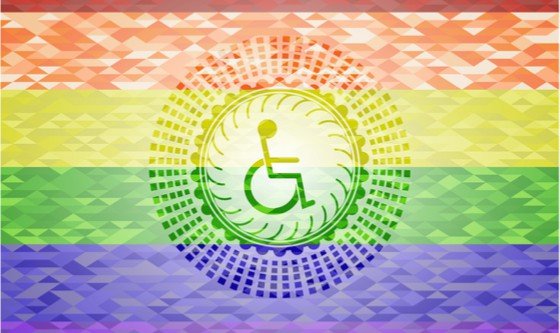
Disabled and LGBT: double the trouble
‘Disabled people have no interest in sex, right? And, if they do, they are straight only. A disabled LGBT person? Now that’s just crazy talk!’ Absolutely not!
Acceptance
The LGBT communities, particularly in Africa, are working hard and tirelessly to gain acceptance in this world. As they should: sexual and gender minority people live all around the world, regardless of age, size, or the colour of one’s skin.
Over the years, the world might have changed with new gadgets and a new sense of what it means to be global citizens but people’s thinking might still be the same. Some still keep their so-called morals and religious ideas, no matter how crazy they might seem.
A non-issue
In most African countries, including Kenya, the subject of same-sex relationships is mostly ignored by the government and the community. This makes many LGBT people afraid to disclose their sexual orientation or gender identity. Many feel that they have to hide behind closed doors, living a life of fantasy rather than reality.
Some even have to live a life pretending to identify as straight rather than gay for fear of rejection or losing one’s life.
Double trouble
This doesn’t necessarily make it easier for a person living with a disability to come out as both queer and disabled. The circle of people you share identities with becomes smaller and smaller.
And the disabled person is likely to experience isolation both outside the LGBT community and within it.
Most of my friends are disabled and so am I. We are young people and are asking questions about sexual attractions and how we understand gender roles. If fortunate, we may have access to sex and relationship educators or mentors. But my research with young people who identify as sexually active and disabled shows that we are often treated as though our gender identity or sexual orientation is just a phase.
Almost every person with a disability can tell you of a time when they sought to express their sexuality, only to be stopped to do so by those around them.
No support
Not recognising that young disabled people can be LGBT and have the ability to have fulfilling sexual lives, reduces the chance that they will receive appropriate help and support in relation to their sexuality or gender throughout their lives. This suggests to me that there is resistance to young disabled people identifying as LGBT and the perception we can’t understand homosexuality.
Society appears more accepting of abled-bodied LGBT youth. Like with any issue affecting marginalised people, disability is something that people rarely take the time to understand, instead choosing to discuss any issues at hand with other able-bodied people. All people, including LGBT people, have a responsibility to not only include, but support the disabled community.
It is critical we have a deeper conversation about inclusion as a community. We need to understand that we face different challenges and have different needs but we are still a community. Without us, you are missing a huge portion of LGBT people, and therefore failing to represent our community sufficiently. Disability for many of us is as much a part of our identity as being LGBT. If you exclude us, you’re slowing down our progress towards equal rights and protection in the world.
Do you have questions about sexual orientation, gender identity, and disabilities? Head to our forum, where our moderators are waiting to lend a helping hand.

ABSOLUTELY!!! LGBT people…
ABSOLUTELY!!! LGBT people with disability are very much part of the LGBT community albeit often invisible. That must end!!a level of consciousness must be generated within LGBT orgs, groups and individuals around LGBT individuals with disabilities. There are already so many internal challenges within the LGBT movement including tensions around gender, around trans and GNC, hiv positive and Aids diagnosed individuals, patriarchy within the movement etc that there seems to be limited time at self interrogation by the movement. Why are certain people, individuals, groups who are LGBT still excluded within the movement. Thank you soo much for this article!!
Thank you so much Ngurufor…
Thank you so much Ngurufor your contribution. We appreciate your thoughts.